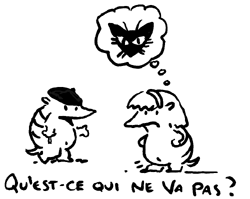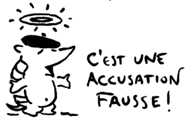Adjectives
Irregular adjectives
Regular adjectives are formed by adding an e to the masculine form in the singular (content / contente), or by adding an s to the masculine and feminine forms in the plural (Tex et Edouard sont contents / Tammy et Bette sont contentes). This group of adjectives is by far the most common. There are, however, a number of adjectives which are called irregular, because they do not have the normal –e, –s, or –es endings. The endings of these irregular adjectives vary widely and often change the pronunciation.
Gender
Some adjectives are completely irregular:
| masculine | feminine | translation |
| doux | douce | soft |
| faux | fausse | false |
| favori | favorite | favorite |
| frais | fraîche | fresh |
| long | longue | long |
| public | publique | public |
Other adjectives can be grouped in categories:
| masculine ending | feminine ending | french | english |
| -el | -elle | cruel / cruelle | cruel |
| -eil | -eille | pareil / pareille | similar |
| -il | -ille | gentil / gentille | kind, nice |
| -on | -onne | mignon / mignonne | cute |
| -s | -sse | gros / grosse | big, fat |
| -en | -enne | ancien / ancienne | old |
| -et | -ète | secret / secrète | secretive |
| -er | -ère | cher / chère | dear, expensive |
| -eux | -euse | heureux / heureuse | happy |
| -eur | -euse | trompeur / trompeuse | deceptive |
| -teur | -trice | créateur / créatrice | creative |
| -f | -ve | actif / active | active |
| -c | -che | franc / franche | frank |
| -ou | -olle | fou / folle | crazy |
Some adjectives have identical masculine and feminine forms. This is generally the case with adjectives ending in e in their masculine form and with foreign adjectives like ‘snob’, ‘cool’, etc. For example: Tex est un tatou imaginaire; Tammy aussi est imaginaire. Ils sont imaginaires. (Tex is an imaginary armadillo; Tammy too is imaginary. They are imaginary.) Here are a few of these adjectives:
| pauvre | poor |
| difficile | difficult |
| sensible | sensitive |
| riche | rich |
| calme | calm |
| semblable | similar |
| mince | slim |
| minuscule | tiny |
| ridicule | ridiculous |
| propre | clean |
| ironique | ironic |
| imaginaire | imaginary |
Number
The majority of adjectives are regular in the plural; that is, an -s is added to the singular masculine or feminine forms. There are two major exceptions to this rule:
- Do not add an s to the masculine form of adjectives ending in s or x. The masculine singular and plural forms are thus identical: un animal heureux (a happy animal), des animaux heureux (happy animals). However, the feminine plural form of these adjectives is regular; it is formed by simply adding an s to the feminine singular form: une fille heureuse (a happy girl), des filles heureuses (happy girls).
- Adjectives ending in al in the masculine singular form change to aux in the masculine plural form.
| Tex est un tatou international. Edouard et Tex sont des animaux internationaux. | Tex is an international armadillo. Edouard and Tex are international animals. |
The feminine plural form of these adjectives is regular; it is formed by simply adding an s to the feminine singular form: Tex aime lire la presse internationale. Tex aime aussi les revues internationales. (Tex likes to read international papers. Tex also likes international magazines).
Listen to this dialogue:

| Tex: Mais, qu’est-ce qui ne va pas? | Tex: But, what’s wrong? | |
| Tammy: C’est encore Bette! Elle n’est jamais sincère! Sois franc Tex. Tu ne la trouves pas capricieuse et cruelle? | Tammy: It’s Bette again! She is never sincere! Be frank Tex. Don’t you find her capricious and cruel? | |
| Tex: Non! Elle est gentille! C’est une bonne amie! Qu’est-ce qu’elle a fait? | Tex: No! She is nice! She is a good friend! What did she do? | |
| Tammy: Comme tu es naïf! Elle me raconte que tu me trouves ennuyeuse, que tu es amoureux d’une de tes étudiantes. C’est vrai? | Tammy: You are so naive! She tells me that you think I’m boring, that you are in love with one of your students. Is that true? | |
| Tex: Tu es folle! C’est une fausse accusation! | Tex: You’re crazy! It’s a false accusation! | |
| Tammy: Hmm … Tu veux que je t’explique? C’est très clair. Elle est jalouse! C’est le complot classique. Elle essaie de nous séparer, nous des amis si loyaux! | Tammy: Hmm … Do you want me to explain? It’s very clear. She is jealous! It’s the classic plot. She is trying to separate us, such loyal friends! |


